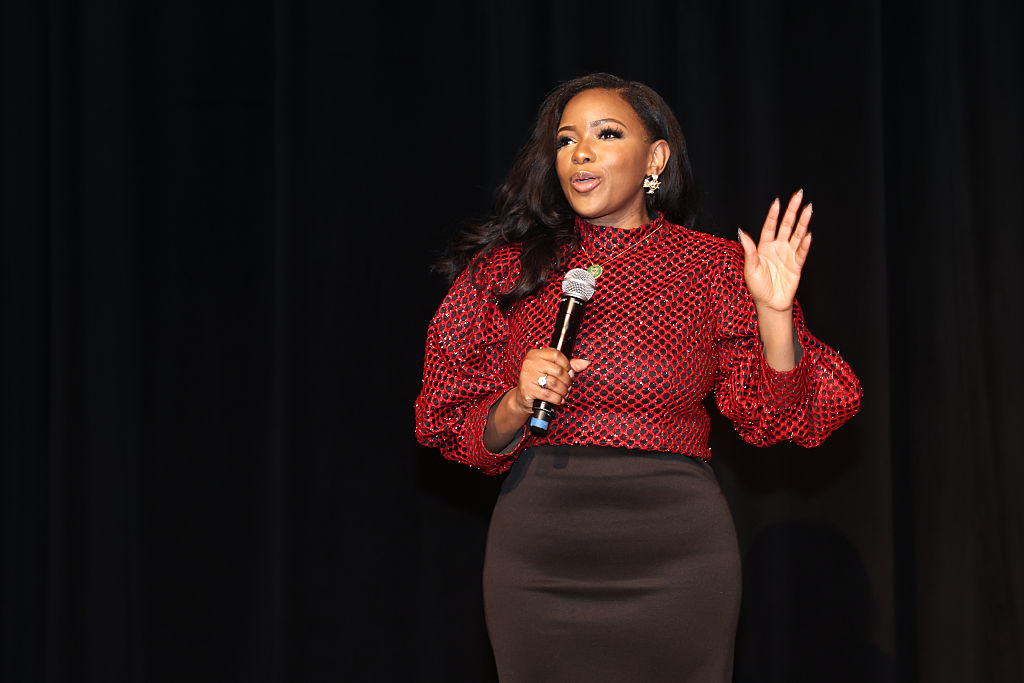Ayanna Pressley Addresses Black Women's Unemployment
Ayanna Pressley Presses Fed Chair To Address Black Women’s Unemployment

Rep. Ayanna Pressley, D-Mass., sent a letter to Federal Reserve Chairman Jerome Powell asking him to address the unemployment rate among Black women after a recent jobs report revealed a significant increase.
According to NBC News, Rep. Ayanna Pressley called Black women’s employment a “key metric of the health of the U.S. economy.” The jobs report revealed that 319,000 fewer Black women were employed in July compared to February of this year. Black women’s unemployment rate increased by 1.3%, with unemployment also increasing 1.5% for Black men. Pressley requested that Powell begin collecting data on changes in Black women’s unemployment so that policy can be created to slow job losses among Black women. She noted in her letter that Black women are the fastest-growing group of entrepreneurs and “disproportionately serve as breadwinners for our families.”
“When coupled with the fact that job openings and hires decreased overall since July 2024, you should see the current economic outlook as a glaring red flag that forbodes danger for the entire country,” Pressley added.
From NBC News:
The Black unemployment rate has long been higher than the rate for the general working population. But “since February 2022, the Black unemployment rate has been steady at 6% and even hit a low of 4.8% in April 2023,” said Gabrielle Smith Finnie, a senior policy analyst for the Joint Center for Political and Economic studies, a think tank that focuses on public policy to help communities of color.
In addition to more systemic barriers around racial discrimination and hiring, Pressley pointed to the rollback of diversity, equity and inclusion programs in public and private sectors and cuts in the federal government’s workforce as factors disproportionately affecting Black unemployment.
“It’s a loss of the wealth of knowledge, of innovation, of skills that Black women contribute everyday,” she said to NBC News.
Rep. Ayanna Pressley also asked Powell to take steps to preserve the Federal Reserve’s autonomy in the wake of President Donald Trump’s firing of Fed Governor Lisa Cook over allegations of mortgage fraud (which is particularly rich coming from a man found liable of fraud). In an interview with NBC News, Pressley cited Cook’s firing as part of a larger “moment of antiblackness on steroids.”
“None of this is by accident,” Pressley said on Monday. “This is discriminate harm. It is precise and it is targeted. And eventually this harm will come for everyone. But the patterns of it, the precision of it, it’s a predictable playbook. It is not happenstance.”
Pressley’s concerns are shared by economic experts who believe this increase in Black women’s unemployment could be a bellwether for a larger economic slowdown. In an interview with MSNBC’s Ali Velshi, New School Economics Professor Darrick Hamilton warned, “The adage ‘Black people are the first fired, last hired’ is indicative of what might come for the rest of us.”
American attitudes about the job market also give validity to Rep. Ayanna Pressley’s concerns. A survey conducted by the Federal Reserve Bank of New York’s Survey of Consumer Expectations found that Americans’ “perceived probability” of obtaining a new job fell 5% to 44.9%, a record low. This lack of confidence in the job market has also led to the rise of “job-hugging” in younger generations, where people stay in jobs not because they like them or offer opportunities for career advancement, but simply because people don’t believe they’d be able to obtain a new job.
As someone who spent the last two years between unemployed and underemployed, I’m acutely aware of how hard it is to get a job. From 2019 to 2021, I transitioned from working in a low-paying office to nearly tripling my income as a TV producer. After being laid off in 2022, I figured it’d be no time at all before I found a comparable job.
Sike.
I quickly found that online job boards are filled with “ghost jobs,” positions companies don’t actually intend to fill. I can’t tell you how many times I’ve gone on an interview, get told they found someone whose “qualifications more closely align with what they’re looking for,” only to see the same job get reposted later in the week. I can tell you firsthand that folks are serious about working, but it doesn’t seem like employers are serious about hiring.
Black women’s unemployment rates, sinking confidence in the job market, and changing attitudes about work all combine to form a portrait of a weakening economy that’s not being helped by an administration whose immigration and tariff policies are only exacerbating these problems.
SEE ALSO:
Unemployment Spike for Black Americans Signals Broader Economic Risks
Unemployment Rate Remained Stubbornly High For Black Women In June
Black Women Affected Most In Latest Jobs Report
Op-Ed: 300,000 Black Women Left Or Were Pushed Out Of The Workforce








